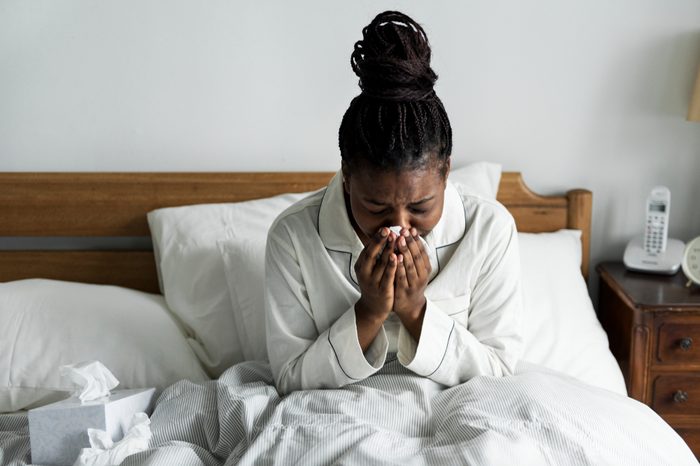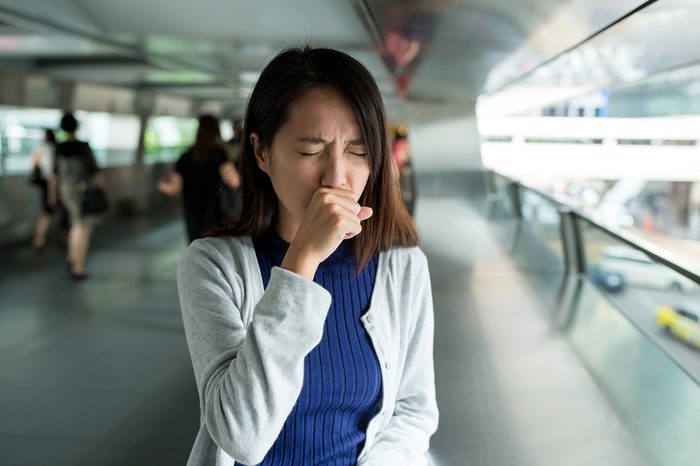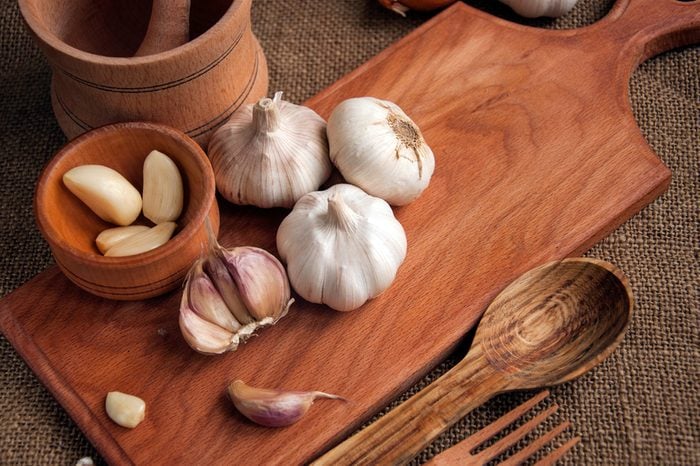Prepare for December
Sad but true: influenza viruses can circulate all year round, but thankfully peak flu season in the United States lasts between December and February. But that doesn’t mean you should wait to get a flu shot, as it can take up to two weeks for antibodies that protect against the flu to develop in response to the vaccine.

The flu affects millions
The Centers for Disease Control and Prevention (CDC) estimate that the flu has been responsible for 9.3 million to 49 million illnesses, 140,000 to 960,000 hospitalizations, and 12,000 to 79,000 deaths annually since 2010. In addition to the flu, several other respiratory illnesses circulate around the same time as flu season, including rhinovirus (one type of virus that causes the common cold), and respiratory syncytial virus (RSV), which can lead to severe illness in young children and is the leading cause of respiratory death in adults 65 years and older. Symptoms in all these infections can be similar, which makes it important to check in with a healthcare provider if you’re not feeling well and want to rule out a more serious condition like the flu or RSV.

Get the flu shot
“The best-proven way to avoid getting sick during flu season is to get the flu vaccination every year,” says Amesh Adalja, MD, a senior scholar at the Johns Hopkins University Center for Health Security. “Though not 100 percent protective it can decrease your chances of getting the flu by about 60 percent when the vaccine is well-matched to circulating strains.” Here are some tricks to make your flu shot painless.

Wash your hands often throughout the day
“RSV, whooping cough and other germs can be spread from unclean hands,” says Neena Xavier, MD, assistant professor at the University of Alabama at Birmingham Department of Clinical and Diagnostic Sciences. “Wash hands with soap and water for at least 20 seconds to get the most benefit. If soap and water aren’t available, carry around or use the alcohol-based hand sanitizers that have at least 60 percent alcohol.” Make sure you’re not making these 10 hand-washing mistakes.

Keep your hands off your face
“It’s important to avoid touching your eyes, nose, and mouth during cold and flu season,” says Dr. Xavier. “When you touch something that is contaminated (like a stair railing or a doorknob) and then touch your mouth or rub your eyes, you can spread [germs] to yourself.” While it’s impossible to not touch a doorknob all day, try to limit contact when possible and wash your hands afterward if you can.

Stay home if you’re not feeling well
In order to help prevent the spread of germs that can cause cold and flu, it’s important to stay home if you’re not feeling well. “If you have symptoms consistent with flu such as fever (a temperature greater 100.4°F), cough, sore throat, muscle aches, fatigue, runny nose it’s best to stay home,” says Ali Riza Nazari, MD, a physician with Providence Medical Group, part of Ascension in Mobile, AL. “Make sure the symptoms have subsided for at least 24 hours before returning to work or going to crowded locations.”

Skip the extra cup of coffee
“Avoid foods and beverages that cause dehydration such as alcohol, coffee, sodas, energy drinks, and other caffeinated drinks,” says Dr. Nazari. That’s not to say you can’t have any coffee if you need to perk yourself up from the grogginess of a cold, just make sure not to overdo it so you don’t take excess fluids out of your body. (Here are 9 ways to get ready for the worst flu month of the year.)

Hit your daily water quota
On top of avoiding drinks that can dehydrate you, it’s important to make sure you’re drinking enough fluids, as staying hydrated will help loosen congestion and relieve your symptoms. “Staying hydrated is even more important when you are ill because the chance of dehydration increases when you are sick,” says Mike Sevilla, MD, a family physician based in Salem, Ohio. “I recommend six to eight glasses of water daily unless your doctor says otherwise.” These 13 tricks will make it easy to make sure you’re drinking enough water.

Eat more fruit
Specifically, blueberries and oranges, says Dr. Sevilla. “Blueberries have antioxidants that can help treat and prevent cough and colds while oranges have vitamin C that may help prevent the common cold for people exposed to illness.” If you’re thinking of taking a supplement, the National Institutes of Health notes that the highest recommended intake for vitamin C is 2,000 mg per day.

Indulge in some dark chocolate
Here’s some cold and flu advice everyone can get behind: It’s possible that eating dark chocolate can help manage your symptoms. Dark chocolate also has an antioxidant that may help decrease coughing, says Dr. Sevilla, though researchers are still working on confirming this finding. Additional research from the Loma Linda University Adventist Health Sciences Center in Loma Linda, California suggested that the flavonoids found in cacao are strong sources of antioxidants and have anti-inflammatory effects that help brain health, cardiovascular health, as well as immunity and mood. Read on for more ways chocolate can boost your health.

Disinfect your cell phone
“Your cell phone travels everywhere with you, and it spends a lot of time near your face,” says Nancie Fitch, DO, area medical director of MedExpress Urgent Care. Sanitize it with a disinfectant wipe and while you’re at it make sure to hit other commonly handled household items, like the remote, light switches, sinks, and countertops. Check out these eight places you should never keep your cell phone.

Remember cough and sneezing etiquette
Dr. Fitch says that droplets from coughs and sneezes can travel and live on surfaces for up to 48 hours, so to prevent the spread of them and the possible contamination of others make sure you’re coughing and sneezing correctly. “Blow your nose and cough into a tissue and if a tissue isn’t available, cough and sneeze into your upper arm or sleeve, washing your hands afterward,” says Dr. Fitch. Wearing a face mask for the flu will also help keep those around you protected.

Cook with garlic
“Garlic has been considered one of the ultimate flu-fighters because it contains a compound called allicin,” says Dr. Fitch. “Allicin is a powerful antimicrobial that can stimulate the production of white blood cells and, in turn, help the immune system respond more quickly to possible invaders.” Find out 17 other natural cold remedies that really work.

Get enough sleep
Those who aren’t consistently getting enough sleep may be more susceptible to getting a cold or the flu. That’s because when we sleep, our bodies produce proteins called cytokines that help fight off infections. If you’re not sleeping enough (around seven to eight hours a night) your body won’t produce the proper amount of cytokines along with other antibodies that help fight off infections. Try some of these 11 simple habits to naturally boost your immune system.

